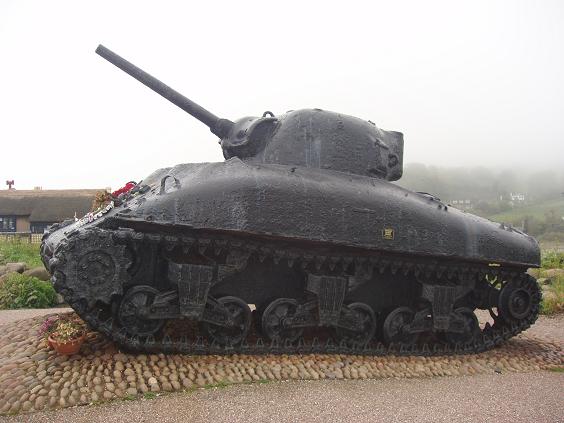Day 07
May 19
Once again I am up early and leave Guy snoozing in the room. When my head hits the pillow at night, I'm out like a light. I am able to get my rest and usually am ready to go when daylight shows up. So I quietly slip out of the room to leave him to his important matters. I wander down to the coffee shop and see that some of the folks are already enjoying their morning tea. We talk about the day and where we will be going. It will be a leisurely ride to some amazing historical sites – not a lot of miles, but some beautiful runs along the southwestern English sea coast. I finish up my breakfast and go back to the room.
“Hey, you gonna sleep all day?” I ask Guy.
“Alright buddy, gotta get goin” he replies.
I gather up my belongings and head out the ST1300. I'm still not as quick packing it as I am my ST1100s, but I'm getting better. The UK riders are already in the lot and getting ready to ride. I see my friend Moff who was so kind to give us our London walking tour, so I go over and give him a big hug.
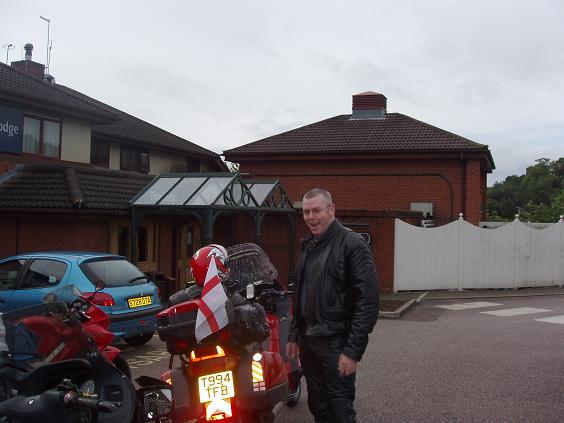
When I get back to my bike, there's couple with a cute little girl who is intently staring at my bike with her dark eyes.
“If it is okay with you, she is more than welcome to sit on the bike” I tell the parents.
“Oh, are you sure it would be all right?” the mom asks.
“Absolutely. I'll start it up so she can honk the horn and rev the motor!”
The little girl just has a big time playing with her new ‘toy'.
“Hold it right there and I will get a picture for you. If you'll send me an e-mail, I'll send you copy of it when I get back” I volunteer and give them one of my business cards.
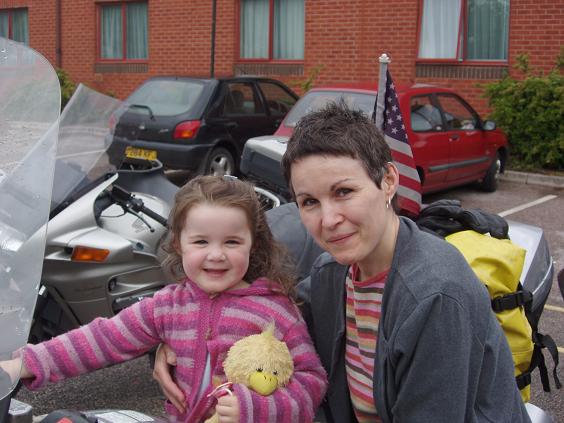
The parents are just amazed that a stranger would volunteer to do that, and they thank me. I can't help but remember when I was a little kid and being fascinated by my granddaddy's motorcycle in the old farm shed. I figure as much bad press that is out there about riders, a little kindness along the way can't hurt. Besides, it might start her a lifelong love of motorcycling. As they walk away, it's time to mount up and Peter explains how the ride will be conducted.
"The lead bike and tail gunner will never change. Anytime we arrive at a point where a decision has to made, I will drop off the number 2 bike. I will signal and expect you to find a safe place to the side, where everyone coming past will know what direction we went. Remain posted at the turn until the gunner comes into view, when you see Moff you know everyone is accounted for, and take the spot directly in front of him, he will let you in. At no time pass the rider ahead of you. Everyone will have a turn near the front. This way you always know who the person is in front and behind you. If one of them comes up missing, let someone know."
It is an incredibly simple system that I have adopted on group rides over here. You do not have to continually check your rear view mirrors, be concerned about keeping up with the rider in front of you, try to stay together for traffic lights or any of the problems inherent with group rides. And for those hot-dogs that always have to be behind the leader, they get put to the back as soon as a turn comes up. With our group of 15 riders, numerous turns and roundabouts and plenty of villages to pass through, we never lose anyone or miss a turn. It's time to pull out and I'm ready for the adventure of the day.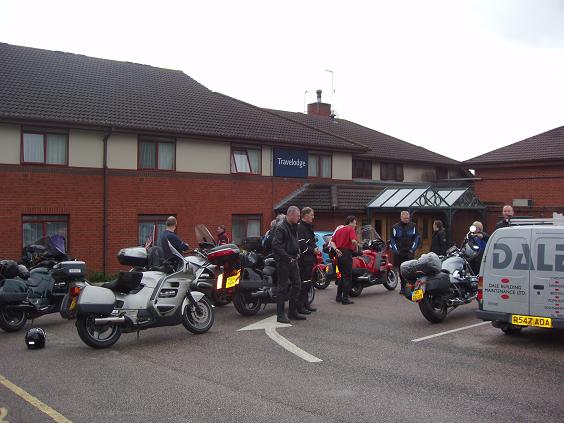
One thing you come to really appreciate riding in the UK is the better discipline of the drivers and the awareness of motorcycles. Drivers expect you to do what you are supposed to for the most part, so if your turn signal is on, you had better turn. I quickly discover that I cannot see the turn indicators on the ST1300, so my UK friends gently remind me of my peril until I do a better job of watching it. The day is cloudy and cool, which makes for good riding. But getting used to the idea of a vehicle on your right, especially in a left hander on a narrow road, still tends to unnerve you a little.
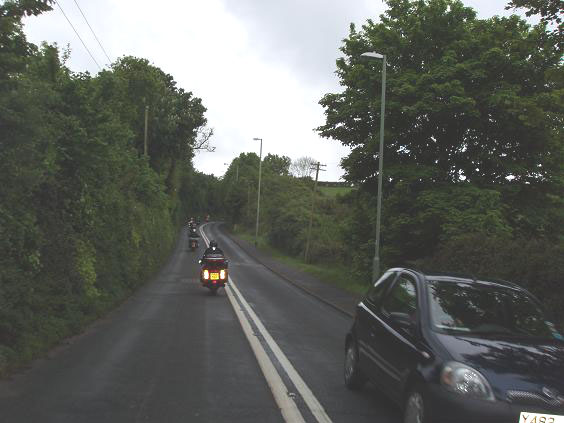
As we pass through the coastal villages we encounter some serious traffic, which will be typical for the day. I notice an unusual sight – a Union Jack fluttering in the coastal breeze. I've seldom seen one flying as I've traveled about the UK
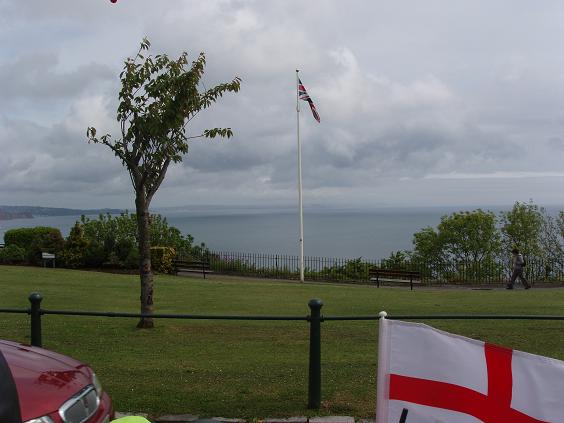
Soon we come to the ferry at Dartmouth, where the Royal Navy has an officer's school. It's quite a collection of ST1100s and ST1300s assembled. Coastal ferries are in frequent use all over the UK and are pretty efficient and can save several hours of travel time. It's been drizzling a bit so you have to really watch going up and down the ramps. It's a bit like a bank robbery – ‘don't nobody make no sudden moves and won't nobody get hurt'. Pieter, a BMW rider from Holland almost drops his bike on the slick surfaces, but several of the fellows come to the rescue.
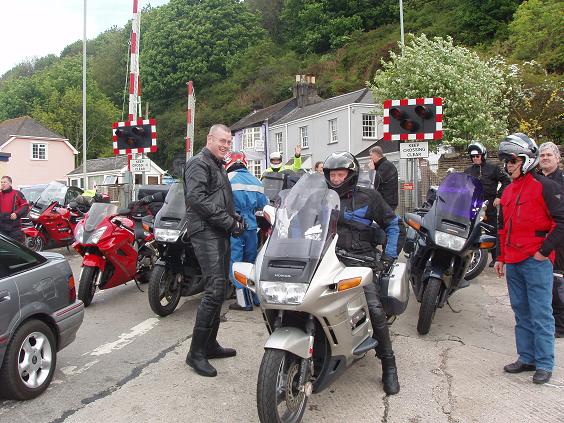
As we leave the city and climb into slightly higher elevations, a fog bank sweeps in and the riders in front of me disappear into it.
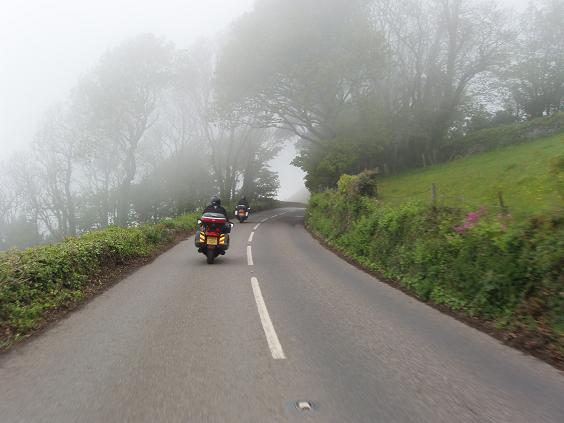
Peter is taking us to a unique area known as Slapton Sands in Devon. During World War II, the Allies took over this part of the country to train for the D-Day invasion because the area was so similar to the beaches at Normandy.
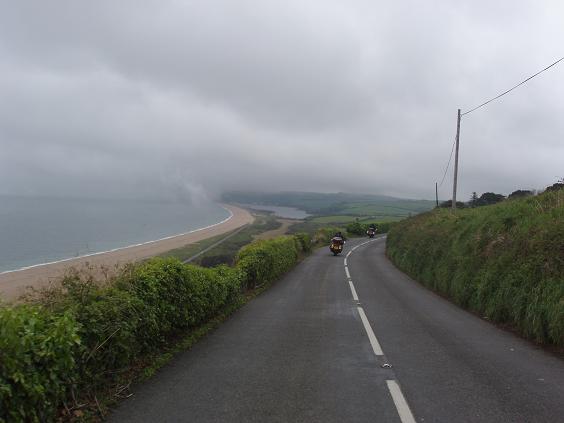
It was a top secret event and there would be bombing and use of live ammunition. The government relocated the local people to other areas of the country so that secrecy could be maintained. During the early hours of April 28, 1944, nine German U-boats intercepted the final training rehearsal for D-Day called Operation Tiger and 946 US servicemen were killed in the ensuing battle. Most loved ones back in the states never knew exactly what happened until one gentleman, Ken Small, later became intrigued with the affair and dedicated his life to finding out what happened. He published a book “The Forgotten Dead” (ISBN 0-7475-7543-6) about his story and research. Almost by accident, he also found an old Sherman Tank that had sunk during the affair. After much effort, he was able to bring it ashore and use it as the centerpiece of a memorial to those who made the ultimate sacrifice.
It is a fitting memorial to a generation that was willing to pay the price to make sure that America remained free. One big difference then was that the media was helping instead of hurting the war effort. Can you even imagine trying to accomplish the same thing today? CNN would be on it like a duck on a junebug, notifying all of our enemies exactly what our plans were and then complaining about the ensuing slaughter. The idea of sacrificing for a greater good seems to have been erased from most of the American minds –except for those great men and women who have joined the military now to serve their country. Having spent two years in the Marines, I have a great appreciation for those who chose to serve. Whenever I see a World War II, Korean or other vet, I always try to thank them for their sacrifice. So I really appreciate Peter planning a stop here so I could take in this bit of forgotten history. There is a nice coffee shop at the memorial, so we wander into it after we've surveyed the area. Moff tells me,
“You've got to have a proper creamed tea now.”
For this simple hillbilly, I'm thinking “Creamed tea – what would a feller put cream in tea for? That's what you do with coffee”, but I keep it to myself. Always one up for trying something different, I tell him –
“Just show me the way.”
He gets me fixed up and it is nothing like what I expected. I receive a wonderful scone (a biscuit where I'm from), some delicious Devon clotted cream, delightful jam, and a nice cup of hot tea. Moff explains to me –
“White sugar goes in the tea, not brown.”
I figure there's a lot more to this that I'll ever know, so I try to take it all in. Then the ‘famous' discussion about the order of application of cream and jam to the scone takes place. It seems that Keith is from Cornwall and Peter is from Devon and they have a major difference of opinion over the proper preparation of a creamed tea. It was quite a robust conversation but I will quote Peter's later written explanation (since I don't have one from Keith) so that I get it straight –
“I can sense that you are wondering just what is the difference between a Devon Cream Tea and a Cornish Cream tea so the important question of the day is - Do you put cream on first and then jam on top; or do you smother your freshly baked scone with zesty fruit preserve and then top with lashings and lashings of thick, thick cream? If you like cream on top then this means that you follow the Cornish method of anointing your scone; and if you put jam uppermost then you are Devonian in your tastes. The folk of Devon and Cornwall both believe their way of dressing scones is correct and best.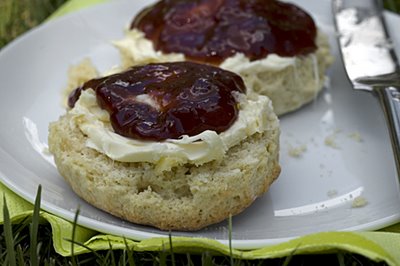
The Correct Devonish Way
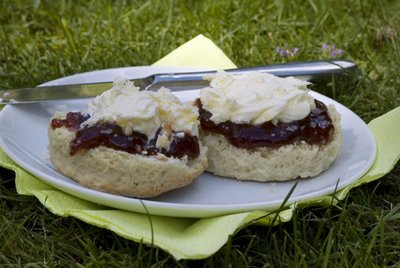
The Incorrect Cornish Way
Then of course the next question which cream Cornish or Devonish as they are made differently. Devonshire clotted cream is made by scalding the milk and then leaving it to stand for several hours and removing the cream/crust which forms on the top. Cornish clotted cream is made by separating the cream from the milk, then heating it and allowing it to cool slowly. Gives a slightly different result. So there you have it - Devon Cream teas are the best because I come from Devon.”
So there you have it as written by a man who knows!
On the rest of the trip whenever I want to get a conversation going, I just bring up the subject and stand back a bit. We finish up our delightful creamed teas, each to their liking, and we are off again down the coast. One thing that always amazes me in the U.K. is the way they just pave around the corner of house. In the states, they would have to knock down the building and such to make room for the SUVs, but not over here.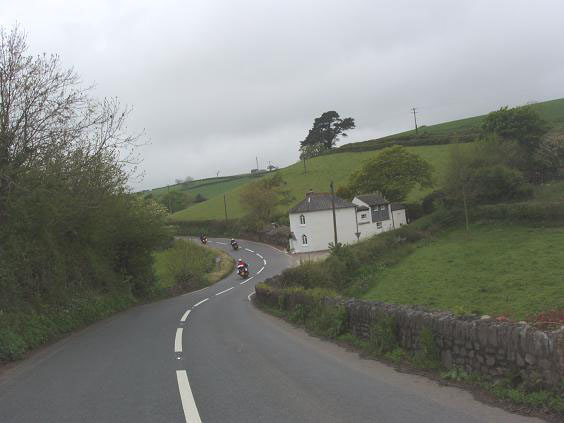
Our next stop is at the sea port of Plymouth. Once thing again, Peter has provided for Guy and me another stop that has major significance to us ‘Yanks'. This is the very place that 102 Pilgrims left to come to the the “New World” on September 16, 1620. They left all, determining never to return, so that they might have true religious freedom. On December 26, 1620 they finally landed at what is now known as Plymouth Rock. Only half of these brave souls would survive that first winter, but they bravely struggled on. And because of their sacrifice and others like them, we have inherited a country that is the “Land of the Free and Home of the Brave”. Fortunately, we can park the bikes right at the docks near a small memorial.
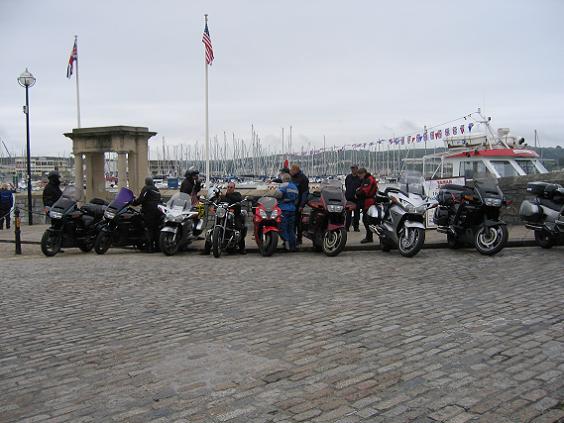
As we look out over the harbor, I can only imagine the excitement and trepidation of those brave folks boarding the Mayflower.
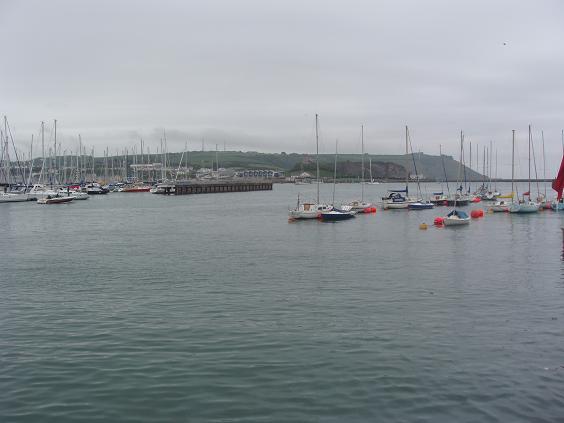
Guy walks through the commemorative arch and is lost in his thoughts about what this place means.
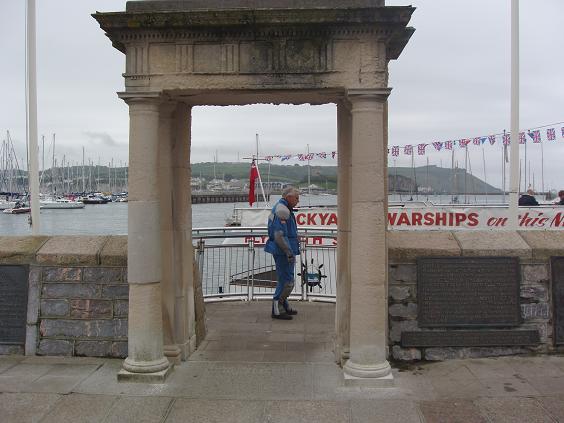
I quietly walk past him and view the actual steps that the Pilgrims used to board for their long journey to the “New World”.
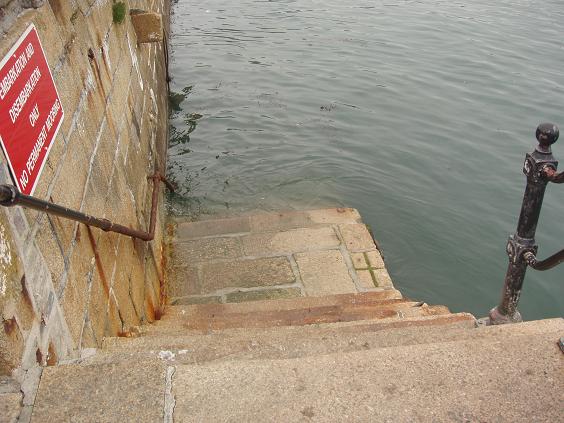
I determine that one of the places I must visit when I return to the states is Plymouth Rock – the other end of the journey. But time is passing too swiftly and we must be on our way. We continue along through various small villages on the narrow streets. Guy is right behind when I see a delivery truck coming right at me – and there's not quite enough room for both of us. It reminds me of the game of chicken we used play back home in cars – who's gonna move over first. I realize that the truck definitely has ‘right of weight' so I gun the ST1300, lean hard to left, move my right leg out of the way and we pass with barely inches to spare. We manage to make our lunch destination in Looe without another close call.
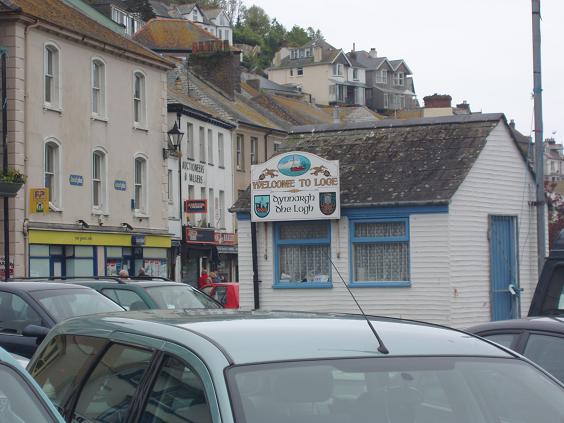
Since most of the fish and chip shops in Looe are not very large, we split up into small groups so we do not overwhelm the folks in one place. The fish and chips you get along the coasts of the U.K. are far and above better than anything you see in the states. They are usually fresh and very tasty, not the ‘under the lamp' stuff that's just been freshly defrosted that we get. I'm not much of seafood person, but when it's fresh seafood I really like it a lot. We still have a pretty good little journey by British standards to get to Pendeen, our stop for the evening, so it's collecting time and we're off again. As we make our way across the southwest part of England, the weather turns a bit for the worse. A slow drizzle sets in and the roads become even slicker.
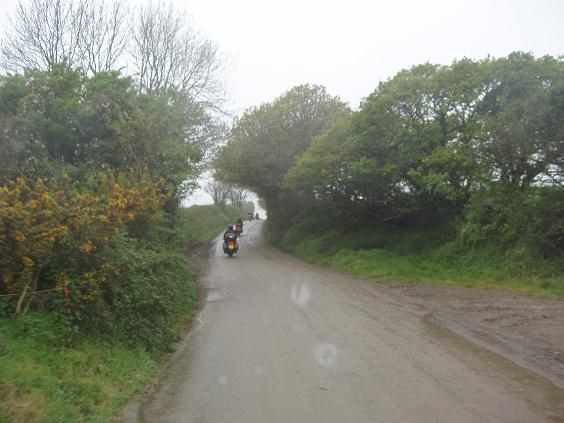
As we pass through some farming villages, Colin, who is in front me of has a bit of ‘tail waggle' as his ST1100 slips on a mysterious liquid on the road. I take note and am extra careful as I pass through the same stuff. Before long, we come to the River Fal in Cornwall. We spend a short time waiting to cross on King Harry Ferry. The name just sort of tickles me when I think about.
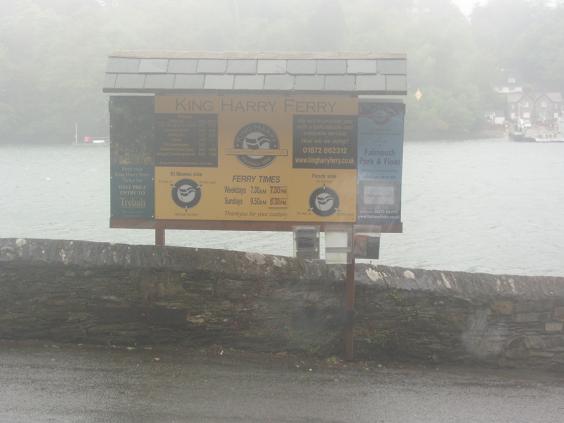
Again, the getting on and getting off the ferry has to be taken with care because of the drizzle that is coming down. But we all manage it with no problems and soon we are back at it. When we finally pull into the North Inn where we have accommodations, the wind has picked up and it is turning cold.
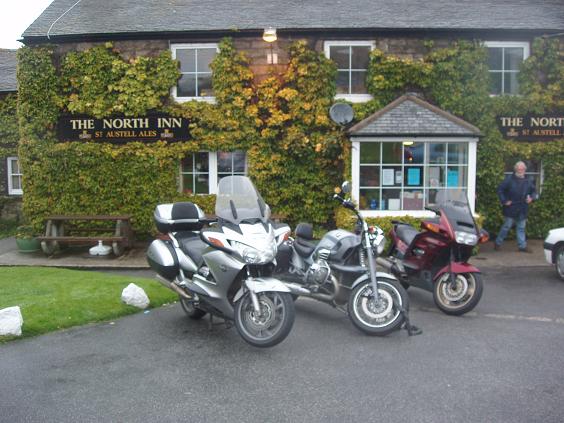
Some of the group are camping along the way on this trip, and I truly feel badly for them. I've camped out in the nasty stuff, and it can be pretty tough when the wind and rain get up like this. As usual, the U.K. group have reserved for Guy and me excellent quarters. Guy, ever cold in this climate and with lack of proper gear, runs a tub of hot water and jumps in, trying to defrost. I take a short nap then it's over to the pub for some supper. Unlike the states, the local pub is usually the community center and gathering place, not just a place to get plastered. You get a real sense of a village by the regulars that frequent them. The food is quite good and the questions are numerous about life back in the States. Before we head back to our room, I tell the campers –
“Look fellers, if it gets real bad out there, there's plenty of floor space in our room. Y'all be welcome to come on in. I'll leave the sliding doors unlocked for you.”
I have a feeling I'll have no takers, but I figured I'd at least give them the option. We wander back to our nice warm and dry room for which we both are thankful. As Guy turns out the lights, he asks –
"Didja tell those boys camping out if it got too bad they could come in here and get on the floor?"
"Yeah, but I dunno if any will take us up on it, but I'm gonna leave the sliding glass door unlocked for them" I tell him.
Although we only rode about 175 miles, it took the major part of the day and the major part of effort to keep out of trouble. Riding over here is a different type of riding that can be as challenging as anything back home. So when the lights are out, it's a quick trip to dreamland.
